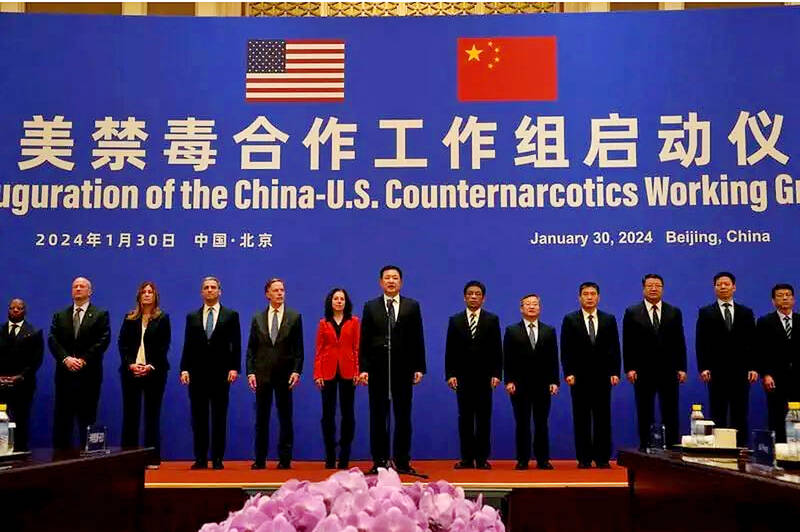Chinese police are investigating a case of illegal foreign exchange activity and money laundering after tip-offs from the US, state media said yesterday.
The US and China restarted talks on counternarcotics and law enforcement cooperation at the start of the year, and China’s public security department lauded the case as a successful example of Sino-US anti-drug cooperation.
The news appeared to corroborate information released by the US Department of Justice on Tuesday, alleging that Mexico’s Sinaloa Cartel conspired with groups based in California and tied to Chinese underground banking to launder drug-trafficking proceeds of more than US$50 million.

Photo: REUTERS
The department said that it closely coordinated with law enforcement in Mexico and China.
Chinese state media said in a brief dispatch that, following US tip-offs, an investigation found that since 2017 a man surnamed Tong started a vehicle dealership in the US, which also offered Chinese yuan and US dollar exchange services for customers.
The operation later evolved into criminal activities including the illegal trading of foreign exchange, Xinhua news agency and China Central Television (CCTV) reported, citing the public security department.
The suspect was arrested and the case is under further investigation, state media said.
The superseding indictment names Tong Peiji as one of the defendants.
When asked about the case at the regular news conference, the Chinese Ministry of Foreign Affairs said: “We refer you to the competent authorities.”
The US, where fentanyl abuse has been a major cause of death, has pushed for deeper law enforcement cooperation, including on tackling illicit finance, and further controls on the chemicals that can be used to make fentanyl.
CCTV reported that the Chinese National Health Commission is to add 46 substances to its supplementary list of controlled non-pharmaceutical narcotic and psychotropic drugs from July 1.

A Chinese aircraft carrier group entered Japan’s economic waters over the weekend, before exiting to conduct drills involving fighter jets, the Japanese Ministry of Defense said yesterday. The Liaoning aircraft carrier, two missile destroyers and one fast combat supply ship sailed about 300km southwest of Japan’s easternmost island of Minamitori on Saturday, a ministry statement said. It was the first time a Chinese aircraft carrier had entered that part of Japan’s exclusive economic zone (EEZ), a ministry spokesman said. “We think the Chinese military is trying to improve its operational capability and ability to conduct operations in distant areas,” the spokesman said. China’s growing

Nine retired generals from Taiwan, Japan and the US have been invited to participate in a tabletop exercise hosted by the Taipei School of Economics and Political Science Foundation tomorrow and Wednesday that simulates a potential Chinese invasion of Taiwan in 2030, the foundation said yesterday. The five retired Taiwanese generals would include retired admiral Lee Hsi-min (李喜明), joined by retired US Navy admiral Michael Mullen and former chief of staff of the Japan Self-Defense Forces general Shigeru Iwasaki, it said. The simulation aims to offer strategic insights into regional security and peace in the Taiwan Strait, it added. Foundation chair Huang Huang-hsiung

PUBLIC WARNING: The two students had been tricked into going to Hong Kong for a ‘high-paying’ job, which sent them to a scam center in Cambodia Police warned the public not to trust job advertisements touting high pay abroad following the return of two college students over the weekend who had been trafficked and forced to work at a cyberscam center in Cambodia. The two victims, surnamed Lee (李), 18, and Lin (林), 19, were interviewed by police after landing in Taiwan on Saturday. Taichung’s Chingshui Police Precinct said in a statement yesterday that the two students are good friends, and Lin had suspended her studies after seeing the ad promising good pay to work in Hong Kong. Lee’s grandfather on Thursday reported to police that Lee had sent

BUILDUP: US General Dan Caine said Chinese military maneuvers are not routine exercises, but instead are ‘rehearsals for a forced unification’ with Taiwan China poses an increasingly aggressive threat to the US and deterring Beijing is the Pentagon’s top regional priority amid its rapid military buildup and invasion drills near Taiwan, US Secretary of Defense Pete Hegseth said on Tuesday. “Our pacing threat is communist China,” Hegseth told the US House of Representatives Appropriations Subcommittee on Defense during an oversight hearing with US General Dan Caine, chairman of the Joint Chiefs of Staff. “Beijing is preparing for war in the Indo-Pacific as part of its broader strategy to dominate that region and then the world,” Hegseth said, adding that if it succeeds, it could derail